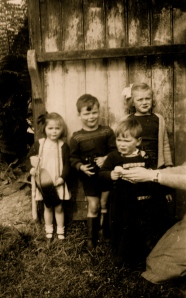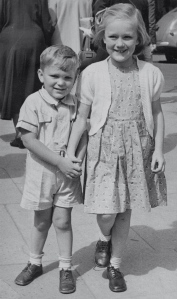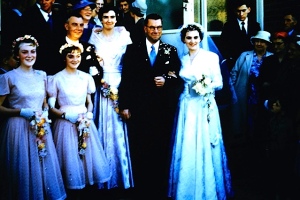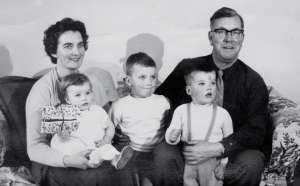I feel uncomfortable about how these snippets of ‘Enduring Threads’ will be perceived. My aim has been to depict the carefree childhood of the 1940s and 1950s. The uncomplicated life of children who were privileged to have a mother at home; the freedom of play without the imposition of parental supervision, and an extensive wider family who enriched our lives.
Awareness of the present generation, our grandchildren, who are growing up with very different perceptions has inspired my recollections. They have the stress of both parents working and the development of technical devices that negate their close affinity with nature. Being driven to school, free play limited and computerisation changing the simple task of, for instance, writing a letter. My sharing of my own experiences through life will, in time, seem the antithesis of their own childhood. So, I continue to write:
Maternal Relations
Exciting holidays with the Roberts-Thomson family were spent in Launceston, at Great Lake, and later in Adelaide. Our cousins came to stay with us in Devonport too. One early incident: I tried to step on a floating object in their fishpond thinking that it would support my weight. Of course it sank and so did I. An early physics lesson.

Barbara, Clive, Peter and Mary Elizabeth
Uncle John was a keen trout fisherman. When we were out fishing on Great Lake, he’d say, ‘Can you spot a bunyip?’
Uncle John’s hobbies were: making flies, photography, woodcarving, playing the violin and astronomy. He built his own telescope and taught himself to play the violin. He was accepted into the Adelaide Symphony Orchestra before his arthritis became problematic. My father joked, (because John was a minister),
‘He can do all that because he only has to work one day a week!’
Auntie Lillian played the piano. Girls were not encouraged to succeed professionally outside the home but she had worked for the family firm before her marriage.
Lillian must have been very frustrated as a housewife and a minister’s wife. She resorted to

Peter and Mary Elizabeth
1949
disciplining the boys with the wooden spoon, and on one occasion it broke when she spanked Clive. All her life she wrote letters weekly to her siblings. After my mother’s death we exchanged letters, keeping up to date with the news of the wider family, until her death at the age of 98.
Cousin Peter ‘s enthusiasm for his environment made him an interesting guide when I visited them as a teenager. We’d cycle to visit the Adelaide Art Gallery, the astronomy observatory, plus sights up in the hills beyond Adelaide. Mary Elizabeth and Peter topped Adelaide University in Medicine. Mary went on to become a paediatrician and married Adel, an Egyptian, against her father’s wishes. Adel later became a professor of nuclear medicine in Canada. He found Australians racist, so they left for America straight after their wedding, later to live in Canada.
Peter R-T went to Oxford after completing his medical degree. He later became a professor at Adelaide University specialising in rheumatology.
Mark R-T always wanted to be a pilot. His parents insisted, ‘ You must do a science degree first, something to fall back on.’ He did this and then became a pilot.
Auntie Mary, Mum’s younger sister, married in her thirties. She travelled overseas on her own prior to her engagement. My parents went to Sydney to welcome her home and the Pyetts moved in to look after us. Clive and Christopher were away at Scotch and Grammar Schools in Launceston. The sweet corn was ripe. My parents sent me a cooking set from Sydney for my birthday. It had miniature cake tins and a small frying pan that I could cook with. Grandma gave me a crystal set (radio) with headphones. This meant I could now listen to 7AD, the local commercial station, and become familiar with top of the pops music. Eric Pyett helped set it up for me in his kind and practical way.
Auntie Mary’s welcome home afternoon tea was organised for her friends to hear about her travels. I had been asked to put out the sugar, which she’d brought back from all of the countries she had visited. I started tearing the packets emptying the sugar, quickly to be told they were to remain in their packaging. How foolish I felt.

Dick Frazer, Jane D, Bob and Mary Gott, Henry, Barbara and Mary Elizabeth 2-11-57
Auntie Mary married Bob Gott on 2nd November 1957. Mary had previously refused to marry Bob and live with his mother, as she and the mother didn’t get on. Fortunately Mrs. Gott died. Cousin Jane was their bridesmaid and Mary Elizabeth and I were the flower girls. My tooth was capped, so that I no longer had a toothless smile; the previous cap I’d swallowed. This wedding ceremony was the first to take place in the newly built St. Columba’s Presbyterian Church in Devonport, followed by a reception at 6 Ronald Street.

Mary Elizabeth, Barbara, Dick Frazer, Jane Donohue, Bob and Mary Gott
Auntie Mary took down the flying ducks on the walls and made 124 her own. Timothy, Robert and Susan were born in quick succession.

Auntie Mary, Susan, Timothy, Robert and Uncle Bob Gott
Cooking was something that Mary learnt, but it didn’t come with the innate ease that my mother seemed to have. Mary and Brenda mixed in different circles, though that could have been due to their age difference. Both appeared very confident people and attracted many people into their orbits.
Uncle Bob bought the newsagency in Rooke Street, and I was able to work there in the school holidays. His eccentric habit of wearing his Scottish tam-o’-shanter brings a smile to those who remember him.

I think writing in passive voice is a product of our times, Barbara. it’s what we grew up reading. I didn’t realise just how much I do it, until I started to blog. The ‘classic editor’ points out all the passive bits I need to liven up. I’m loving your story, Barbara – had to catch up from #7 because I kept putting off visiting until I had plenty of time to read and soak it up. I love all the photos. Thanks for sharing. ❤
LikeLike
Christine, I’m constantly falling into the trap of writing in the passive voice. It is a continual learning curve for me the writing business!
I am glad that you can relate to the story Christine. Thanks for your comments. ❤
LikeLike
Thanks Glen for your thoughtful comment. It is interesting that you too see a generational difference, being younger. We’re lucky to be living in a small community where the children do play on the street, but I do know that is unusual. Technology has changed a lot of habits. You mention a high achieving family…. not all of us, but some! I shall write about school very soon… I was not a high achiever like some in the family! 🙂
LikeLike
Hello Barbara, kids certainly do have it different these days. I notice the difference in them and I was born in 1965. When I grew up we got our roller skates, tricycles, bicycles, scooters and skate boards and took to the streets with the other kinds. Nowadays the streets are mostly empty with kids on their computers and playing video games and all things electronic that keep them house bound and tethered to technology.
Thanks for the introductory paragraph that gives perspective to your writing.
You seem to come from a high achieving family.
I look forward to the next instalment.
LikeLiked by 1 person
I like Enduring Threads: part 11, very much, the way it was written, I almost sure that you are not writing this memoirs to win the Nobel Prize, but to give important ancestral information about your family and convey it to the actual and future generations. Thank you Barbara! 🙂
LikeLiked by 1 person
Thanks HJ for your encouragement. I enjoy writing, even though I have a lot to learn. I appreciate all that fellow bloggers have been able to impart, so that it can become a stronger story. 🙂
LikeLike
Thanks Deb, but there are still questions I didn’t ask! It is strange how we always think of things when it is too late. Whether anyone will be interested in these recollections is another thing, am not sure that they will be with their busy lives….
LikeLike
Barbara your family will surely thank you for all the detail you are including in these recollections, I wish I had known more about my mother’s life, or my grandmother’s, but I didn’t ask the right questions at the right time. You are making sure your relatives won’t need to, you are doing the work for them, and all power to you for doing that.
LikeLiked by 2 people
Hi Barbara, I don’t think you should feel uncomfortable about these snippets. They are a valuable glimpse into a different kind of childhood. My own children are having a very different experience to the one I had when I was growing up. Some of the changes are for the better, some are not. I think it is important that some of us are chronicling the old ways. Thank you for sharing your wonderful memories with us.
LikeLiked by 1 person
Thanks Sarah, I hope it is interesting enough! Certainly life styles have changed.
LikeLike
Absolutely, and they seem to change ever faster.
I think they are interesting. I’m sure I’m not the only one. 🙂 I like the similarities and differences between yours and my own family history. I’m often surprised by both given that we live in different hemispheres but speak the same language.
LikeLiked by 1 person
Sarah, Australia is multicultural now, but our traditions were initially British. Our diets probably diverged in the 1950s with the introduction of Mediterranean influences and later Asian. I like the British tradition of the eccentric being cherished, so hope to include some of these qualities soon… I’m glad that you can see some similarities to your own life and family history, even though we live so far apart. 🙂
LikeLiked by 1 person
Dear Raja, yes, the flying ducks were in sets of 3 displayed on walls. I think there were two sets. 124 was the number of the street she lived in!! You did make me smile!! ❤
LikeLiked by 1 person
LOL! Got to read more carefully next time 😀
LikeLiked by 1 person
:D. 😀
LikeLike
I have my grandma’s set of flying pheasants. 😀 Raja, the sets were all of identical birds, but diminishing in size to help the illusion of flight. I saw a set of flying pigs once!
LikeLiked by 1 person
aaah…now I get the picture. Thanks Christine. Still can’t get over the blooper though! 124 ducks indeed 😀
LikeLike
Raja, I loved the thought of 124 ducks flying around the walls!! 🙂 😀
LikeLiked by 1 person
Wow! Flying pheasants would be worth something! When we visit the antique warehouse, I always think of my aunt as the flying ducks are quite sought after now!! 🙂
LikeLiked by 1 person
Hello Barbara 🙂
I am curious. You mentioned “the flying ducks”? What are they? I imagine these are wall decorations, since you noted that “Auntie Mary made 124 her own.” I may be wrong but that’s a Lot of ducks flying around in a room..! ❤️
LikeLiked by 1 person
Martha, that sounds traumatic! I hope one day you’ll have the strength to share it all. I love the way you write. For me, the childhood is easier to write than the adult life… especially knowing what to leave out.
In a way it is therapeutic, but there again, allowing others into secrets is quite daunting. Without the dramas it would be boring, so I’ve chosen some to share…. not wanting to shock my children too much! Otherwise one could write it more fully, only to be read when one has departed this life! 🙂 Thanks for your help, I appreciate it as it has made me look more freshly at things. ❤
LikeLike
My mom was a secret alcoholic and she was never very nice to me. I grew up believing many things about her that weren’t true. Some of these things she told me and some were just my way, as a child, of creating a liveable reality. I’ve since learned that this is often the way the oldest child of an alcoholic keeps his/her life in control. The irony of the whole thing is that if I’d KNOWN she was a drunk, I would have tried to help her and I would have understood what motivated her (very erratic) behavior. I would also have been able to walk away. As it was, I blamed myself for the numerous problems in our relationship and I constantly tried to make amends for having been a bad daughter. That is, of course, one of the strategies alcoholics use to assure their own safety and pursuit of their addiction. I feel so sorry for my mom and the sad turn her life took. I can’t help but love her, but I also truly hate her for her cruelty and dishonesty. The other day in my packing I happened on her old passports. In one of them she actually looked happy in the photograph. I wish that could have been an abiding state for her.
I will write it, probably as a novel, though, so I can limit the line of the story and reduce the complexity so that I can say something particular. I have written aspects of my mom into one of my books. That was liberating, to see her reflected in the behavior of a character whose one loss created such a bitterness in her that she could find no place to live than in anger and loss, in spite of the good that was all around her.
LikeLiked by 1 person
Thank you Martha for sharing your personal and traumatic background. I can only imagine how you, as a young child, managed to survive such a debilitating start to life.
I’m glad though that it gives you the impetus to write such strong stories. I’m sure she loved you, but for the drink. I do wish you well with your move, always a bit of a dis- stabilising thing in any life. May you find happiness in your new home!
LikeLike
Thank you! I didn’t even know about my mom until she was a few weeks away from dying (I was 44). I learned it through the results of a Cat Scan, so I don’t think I suffered much except from confusion. 🙂
LikeLiked by 1 person
Perhaps identifying your Mom’s problem helped understand why she’d been as she’d been?
Still doesn’t take away from the finality of death though, especially at 44, when her death must have been hurtful, as well as confusing… thanks Martha for writing about it. ❤
LikeLiked by 1 person
I was 44 when she died. She was 76, but learning about her made me appreciate the importance of the truth and understand how facts can clarify ones mind! I was also very fortunate to have had loving aunts — her sisters — who were there with me every step of the way as I worked toward understanding what had happened. My mom might have been a better mom, but I could not have had a better family. I’m grateful for them every day. ❤
LikeLiked by 1 person
Martha, I’m so glad that you had your aunts there to support you. Love is the best gift any child can receive.
LikeLike
I have a comment and please, Barbara, take it as it’s meant. You tend to write in the passive voice. Now that I know that you are really trying to memorialize a way of living for the future kids to see, I’m going to recommend avoiding the passive voice. The strange thing about the passive voice is that, for most readers, it creates a distance between the things/experiences being described and them. It’s actually used for that reason when a government doesn’t want to accept responsibility for a heinous act or a corporation wants to fire someone, you know, “It has come to our attention…” that kind of voice. I think if you shift to the active voice you’ll find two things happening. 1) You’ll need fewer words to say what you want and 2) the scenes you describe will be much easier for others to relate to. It will open up the possibility of the vicarious experience it seems you want to provide/offer. Where you use the active voice, the story is very interesting.
Here’s an example.
Passive voice: “Holidays with the Roberts-Thomson family in Launceston, at Great Lake, and later in Adelaide
were all exciting.”
Active voice: “We were excited to spend our holidays in Launceston, at Great Lake and later in Adelaide.”
I don’t know if I’ve helped or not, but give it a thought. There’s just a lot more energy and immediacy in the active voice. I think these stories matter and people need to want to read them.
LikeLiked by 1 person
Dear Martha, I do appreciate you input. I agree, now that you point it out! I shall try to write in the active voice and see how I go!! I guess it’s my way sometimes of distancing myself from it too.
LikeLike
I think we’re all of us taught to write that way in school if we’re being serious and/or formal. I think you can get by with just talking to your reader. I think you’re very brave. I am sorting through stuff in preparation to move and today I happened on about 100 pages of memoir I wrote about my family. I wrote it before I knew the truth about my mom. I couldn’t read it without crying at the innocence and faith I had as a 35 year old. Sometimes life is a lot easier to bear when you don’t know how some of the parts turn out.
LikeLiked by 2 people